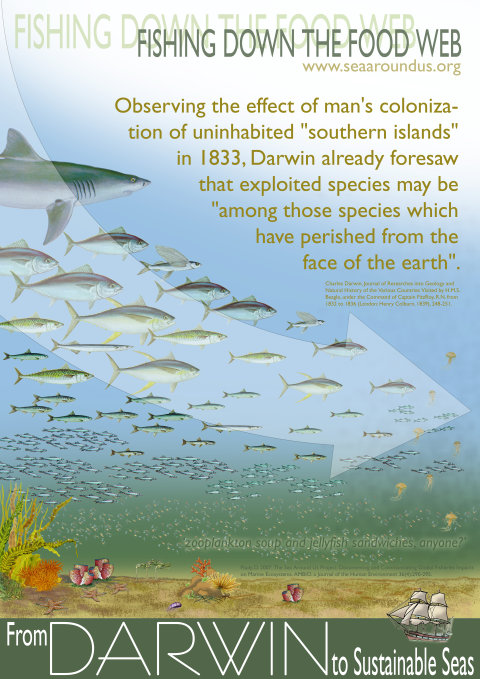Poster 5: Fishing down the food webs
Observing the lush South American nature around him, Darwin saw the value of kelp forests as home to a wide range of life and writes “[…] I can only compare these great aquatic forests of the southern hemisphere with the terrestrial ones in the intertropical regions. Yet if in any country a forest was destroyed, I do not believe nearly so many species of animals would perish, as here from the destruction of the kelp. Amidst the leaves of this plant numerous species of fish live, which nowhere else could find food or shelter; with their destruction the many cormorants and other fishing birds, the otters, seals, and porpoises, would soon perish also; and lastly, the Fuegian savage, the miserable lord of this miserable land, would redouble his cannibal feast, decrease in numbers and perhaprs cease to exist.” 1)

Beyond the specific case, scientists have documented the dramatic effects fisheries have had on marine and coastal ecosystems around the world in an accelerated way in the last 50 to 100 years. What we study today, is usually a shadow of its former self. In the North Atlantic, a data-rich region for such analyses, biomasses of large predators, which are often key to keeping ecosystems productive, are between 5 and 10% of what they were 100 years ago. 3)
It is becoming apparent that if biomasses of important species in the food web get depressed below 20% of their original density for protracted times, the functioning of the ecosystem and its ability to regenerate to earlier states is severely jeopardised. 4)
1 Darwin, C. 1846. Journal of Researches into the Natural History and Geology of the Countries Visited During the Voyage of H.M.S. Beagle Round the World, Under the Command of Capt. Fitz Roy, R.N. Vol. 1. New York: Harper & Brothers, Publishers, 309-310.
2 Tegner, M.J. And P.K. Dayton, 2000. Ecosystem effects of fishing in kelp forest communities. ICES Journal of Marine Science, 57:579-589.
3 Christensen, V., S. Guénette, J.J. Heymans, C.J. Walters, R. Watson, D. Zeller and D. Pauly, 2003. Hundred-year decline of North Atlantic predatory fishes. Fish and Fisheries, 4:1-24.
4 Froese, R. and A. Proelß, 2010. Rebuilding fish stocks no later than 2015: Will Europe meet the deadline? Fish and Fisheries, DOI: 10.1111/j.1467-2979.2009.00349.x









